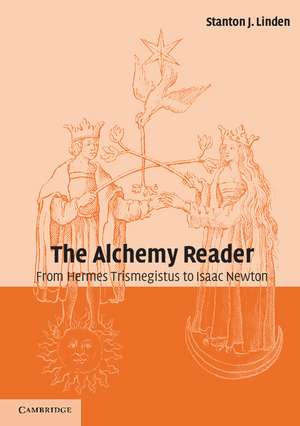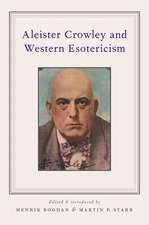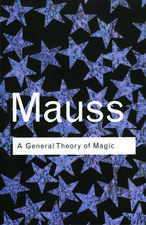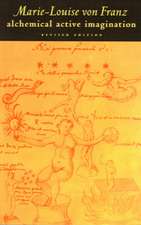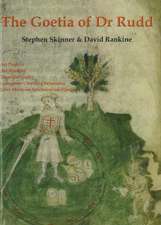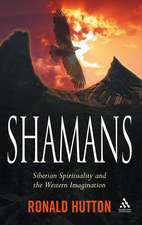The Alchemy Reader: From Hermes Trismegistus to Isaac Newton
Editat de Stanton J. Lindenen Limba Engleză Paperback – 27 aug 2003
| Toate formatele și edițiile | Preț | Express |
|---|---|---|
| Paperback (1) | 162.90 lei 22-36 zile | |
| Cambridge University Press – 27 aug 2003 | 162.90 lei 22-36 zile | |
| Hardback (1) | 607.04 lei 43-57 zile | |
| Cambridge University Press – 27 aug 2003 | 607.04 lei 43-57 zile |
Preț: 162.90 lei
Nou
Puncte Express: 244
Preț estimativ în valută:
31.18€ • 33.88$ • 26.21£
31.18€ • 33.88$ • 26.21£
Carte disponibilă
Livrare economică 31 martie-14 aprilie
Preluare comenzi: 021 569.72.76
Specificații
ISBN-13: 9780521796620
ISBN-10: 0521796628
Pagini: 288
Ilustrații: 14 b/w illus.
Dimensiuni: 168 x 241 x 18 mm
Greutate: 0.45 kg
Ediția:New.
Editura: Cambridge University Press
Colecția Cambridge University Press
Locul publicării:Cambridge, United Kingdom
ISBN-10: 0521796628
Pagini: 288
Ilustrații: 14 b/w illus.
Dimensiuni: 168 x 241 x 18 mm
Greutate: 0.45 kg
Ediția:New.
Editura: Cambridge University Press
Colecția Cambridge University Press
Locul publicării:Cambridge, United Kingdom
Cuprins
Introduction; Part I. Ancient Texts: 1. Hermes Trismegistus: The Emerald Table (Tabula smaragdina); 2. Plato: from the Timaeus; 3. Aristotle: from the Meteorology; 4. Pseudo-Democritus: from the Treatise of Democritus on Things Natural and Mystical; 5. Anonymous: Dialogue of Cleopatra and the Philosophers; 6. Anonymous: from Leiden Papyrus X and the Stockholm Papyrus; 7. Zosimos of Panopolis: Of Virtue, Lesson 1-3; 8. Stephanos of Alexandria: from The Great and Sacred Art of the Making of Gold; 9. Anonymous: The Poem of the Philosopher Theophrastos upon the Sacred Art; Part II. Islamic and Medieval Texts: 10. Khalid ibn Yazid: from Secreta Alchymiae; 11. Pseudo-Geber: from Of the Investigation or Search of Perfection; Of the Sum of Perfection; and His Book of Furnaces; 12. Avicenna: De Congelatione et Conglutinatione Lapidum; 13. Albertus Magnus: from the Libellus de Alchimia; 14. Roger Bacon: from the Radix Mundi; 15. Nicolas Flamel: from His Exposition of the Hieroglyphical Figures; 16. Bernard, Earl of Trevisan: A Treatise of the Philosophers Stone; 17. George Ripley: The Epistle of George Ripley written to King Edward the 4; Part III. Renaissance and Seventeenth Century Texts: 18. Paracelsus: from Of the Nature of Things and Paracelsus His Aurora; 19. Francis Anthony: Aurum-Potabile: or the Receit of Dr. Fr. Antonie; 20. Michael Sendivogius: from A New Light of Alchymie and A Dialogue between Mercury, the Alchymist and Nature; 21. Robert Fludd: from Mosaicall Philosophy; 22. Gabriel Plattes: A Caveat for Alchymists; 23. John French: preface to The Divine Pymander of Hermes Mercurius Trimegistus in XVII Books; 24. George Starkey/Eirenaeus Philalethes: The Admirable Efficacy, and almost incredible Virtue of true Oyl; from An Exposition Upon Sir George Ripley's Epistle to King Edward IV; 25. Elias Ashmole: Prolegomena to the Theatrum Chemicum Britannicum; 26. Robert Boyle: from An Historical Account of a Degradation of Gold Made by an Anti-Elixir: A Strange Chymical Narrative; 27. Isaac Newton: The Key (Keynes MS 18); The Commentary on the Emerald Tablet (Keynes MS 28), King's College, Cambridge; Glossary; Bibliography; Index.
Recenzii
'Linden's introduction to the collection and the headnotes accompanying each selection, which testify to Linden's long experience and wide reading in the history and texts of alchemy, will help make this a much-used volume.' British Society for the History of Science
Descriere
An introduction to a wide range of alchemical authors and works.
Notă biografică
Stanton J. Linden is Professor Emeritus of English, Washington State University. His publications include Darke Hierogliphicks: Alchemy in English Literature from Chaucer to the Restoration (1996), Emblems and Alchemy (co-editor, 1998), and a critical edition of George Ripley's Compound of Alchymy (2001).
